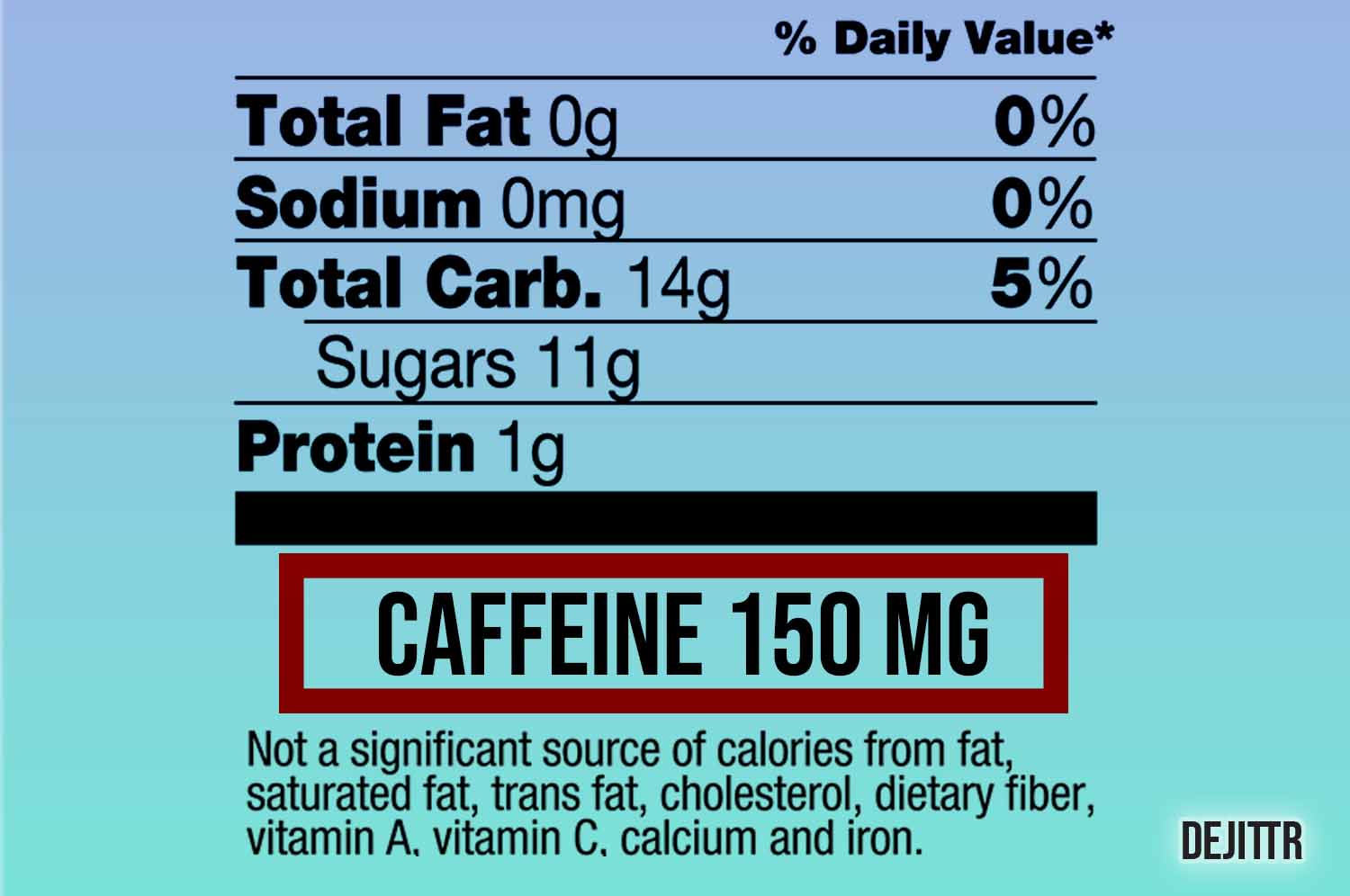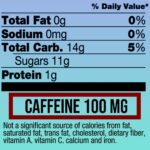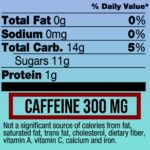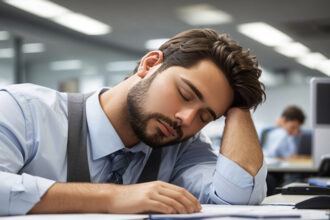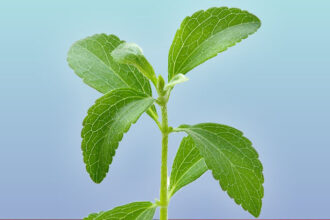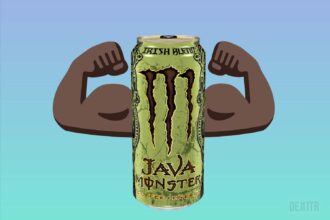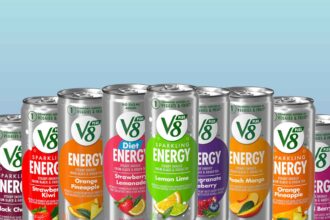Looking for an energy boost to power through your day? Discover which energy drinks pack a punch with 150 mg of caffeine.
Some energy drinks that contain approximately 150 mg of caffeine include:
- Monster Energy Drink (16 fl oz) – 160 mg of caffeine
- Rockstar Energy Drink (16 fl oz) – 160 mg of caffeine
- NOS Energy Drink (16 fl oz) – 160 mg of caffeine
- ZOA Energy Drink (16 fl oz) – 160 mg of caffeine
- Prime Energy Drink (12 fl oz) – 200 mg of caffeine
Now before discussing more about these energy drinks that can provide a 150 mg caffeine dosage, let’s briefly consider whether this amount of caffeine is too much or not. Then, we can delve into the specifics.
Is 150 Mg Of Caffeine A Lot?
| Caffeine Levels: | Commentary: |
| 50 mg | Usually this much caffeine is present in an average cup of black tea |
| 100 mg | Usually this much caffeine is present in present in one cup of coffee |
| 200 mg | Usually this much caffeine is present in many energy drinks |
| 250 – 700 mg | Excess caffeine consumption symptoms starts like headache, nausea, or anxiety |
| 1000 mg | Chances of heart palpitation and major health risks |
Whether 150 mg of caffeine is a lot or not depends on a few factors such as individual tolerance, frequency of consumption, and the source of caffeine.
In general, 150 mg of caffeine is a moderate amount and can be found in some energy drinks, as well as coffee and tea.
For most healthy adults, up to 400 mg of caffeine per day is considered safe and is not associated with any adverse health effects. This is equivalent to about four cups of coffee. Therefore, 150 mg of caffeine per day is well below the recommended limit and is unlikely to cause any negative effects.
However, it is essential to keep in mind that caffeine sensitivity can vary from person to person. Some individuals may experience negative side effects such as headaches, anxiety, or jitters with even smaller amounts of caffeine, while others may tolerate much higher doses without any issues.
It is also important to consider the frequency of caffeine consumption. Consuming 150 mg of caffeine occasionally or infrequently is unlikely to cause any problems. However, regularly consuming high amounts of caffeine can lead to dependence, tolerance, and even withdrawal symptoms when attempting to quit.
In short, 150 mg of caffeine is a moderate amount and is considered safe for most healthy adults when consumed in moderation. However, it is essential to monitor your caffeine intake and pay attention to how your body reacts to caffeine to determine what amount works best for you.
Energy Drinks With 150 Mg Or More Caffeine
#1. Monster Energy Drink
Monster Energy Drink is a well-known brand of energy drink that has been around since 2002. It is known for its distinctive black and green packaging and its sponsorship of extreme sports and other high-energy events.
The drink itself contains high levels of caffeine, as well as other ingredients like taurine, ginseng, and B vitamins, which are all intended to provide a quick burst of energy and increased mental focus.
Monster comes in a variety of flavors, ranging from classic energy drink flavors like Original and Ultra, to more adventurous options like Pipeline Punch and Dragon Tea.
Monster Energy Drink in a 16 fl oz can contains a substantial 160 mg of caffeine, providing a potent and convenient source of energy for those who need a quick boost.
#2. Rockstar Energy Drink
Rockstar Energy Drink is a popular brand of energy drink that is well-known for its bold, edgy branding and powerful caffeine content. It was first introduced in 2001 and has since become a favorite among many consumers, particularly those who lead active and busy lifestyles.
Rockstar offers a wide range of flavors and varieties, from classic options like Original and Zero Carb to more unique flavors like Punched and Guava.
The drinks are typically sold in brightly colored cans with eye-catching graphics and designs, making them easy to spot on store shelves. A 16 fl oz can of Rockstar Energy Drink packs a powerful punch with 160 mg of caffeine.
#3. NOS Energy Drink
NOS Energy Drink is a popular brand of energy drink that is known for its high-powered caffeine content and bold, distinctive flavor.
The brand was first introduced in 2005 and has since become a popular choice for those who need a quick pick-me-up during a busy day. Each 16 fl oz of this drink is powered with 160 mg of caffeine.
#4. ZOA Energy Drink
ZOA Energy Drink is a relatively new brand of energy drink that was created by actor Dwayne “The Rock” Johnson and his business partners. The drink is marketed as a healthier alternative to traditional energy drinks, with an emphasis on natural ingredients and functional benefits.
ZOA comes in a range of flavors, including Original, Lemon Lime, Wild Orange, and Pineapple Coconut. The caffeine content of ZOA energy drink is 160 mg per 16 fl oz.
#5. Prime Energy Drink
Prime Energy, a new energy drink created by Logan Paul and KSI, has caused quite a buzz since its release was announced. Prime Energy has been hailed as a wholesome replacement for sugary energy drinks, sodas, and coffee drinks.
It has no artificial sweeteners, or sugar added, making it a low-sugar option for dieters. Additionally, Prime contains around 300 mg of electrolytes, which helps replenish your body after strenuous exercise.
Additionally, each 12-ounce can of the beverage has around 200 mg of caffeine.
Learn More: Is Prime Energy Drink Healthy? [Reviewed]
Chart Showing Caffeine Content Of Popular Beverages:
| Beverage: | Caffeine Quantity | Quantity For 300 mg caffeine content |
| Coke | 32 mg per 12 oz can | 10 such cans |
| Red Bull | 80 mg per 8 oz can | 4 such cans |
| Monster Energy Drink | 160 mg per 16 fl oz can | 2 such cans |
| Brewed Coffee | 95 mg per 8 oz cup | 4 such cups |
| Tea | 47 mg caffeine per 8 oz cup | 7 such cups |
What Are The Signs That You Had Too Much Caffeine?
Caffeine is a naturally occurring stimulant that is found in a number of foods and drinks. Caffeine is harmless in moderation, but excessive use might have negative effects. There are several telltale symptoms of caffeine overdose:
Anxiety: Caffeine is known to amplify the symptoms of preexisting anxiety disorders and to induce them in those who have never experienced them before.
Heart rate: Caffeine may increase your heart rate, making you feel like your heart is racing. Some individuals might find this disconcerting or even frightening.
Water Loss: Caffeine is a diuretic, therefore it might lead to dehydration if you consume too much of it.
Jitteriness: One of the most common overdose of caffeine symptoms includes trembling hands and feet, along with feelings of agitation and nervousness.
Insomnia: Caffeine makes it difficult to fall asleep and remain asleep. Caffeine in excess might make you feel lightheaded or dizzy.
Headache: Too much coffee might give you a headache or exacerbate an existing one.
Nausea: Caffeine in large quantities may produce stomach discomfort, which can lead to feelings of nausea and, in extreme circumstances, vomiting.
These are all signs that you may have had too much caffeine and should try to reduce your intake. If you want to prevent these uncomfortable effects, reducing your caffeine consumption is a smart option.
Recommended Read: First Time Drinking an Energy Drink? [Beginners Guide]


